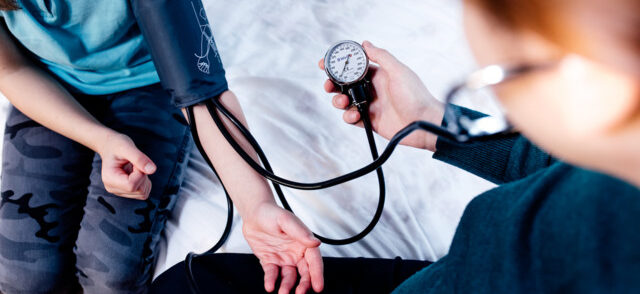Heart health is important for adults AND kids alike. The habits that we establish as young children, such as lifestyle choices and the way we eat, are carried with us into adulthood. In fact, there is some research to suggest that heart disease can start in childhood – and perhaps even in utero during pregnancy, since what the mother eats influences the baby’s food preferences.
As the medical director for the Center for Better Health and Nutrition, I’ve witnessed the epidemic of childhood obesity and the impact it’s having on kids’ hearts. An early concern is that it can start developing in kids without any symptoms. However, the good news is that there are early detection screenings available and once discovered, heart disease in children may be reversed. Here are important steps parents can take to keep their kids’ hearts healthy:
6 Steps To Keep All Kids’ Hearts Healthy
1. Know the risks
Kids receive a fresh heart when they’re born and what happens through life really depends upon the individual. They can develop high cholesterol, blood pressure and blood sugar, and even type 2 diabetes. All of these can lead to the development of cardiovascular disease. At the end of this decade, it is projected that there will be 500 million type 2 diabetics worldwide. Currently, about 26% of kids being treated for obesity already have type 2 diabetes or are in the pre-diabetic range.
2. Learn the warning signs
While many kids who are developing heart issues are asymptomatic, there are some signs parents can watch for. During exercise, they may tire out sooner than other kids or become short of breath when others don’t. If you’ve noticed your child exhibiting this behavior or complaining of chest pain, I suggest scheduling an appointment with his or her primary care provider.
Before exercise intolerance happens, though, parents can keep an eye on their habits. Are you noticing a pattern of them lying on the couch or playing video games more than usual? Or consuming unhealthy foods more frequently? Sure, playing video games and eating junk food occasionally can be part of a balanced diet and lifestyle. However, it can become problematic when it is an increasing and ongoing habit and/or interferes with making healthy choices.
I would also recommend keeping an eye on your kids’ weight and BMI. The CDC offers an easy BMI calculator. If their BMI is above the 85th percentile and it’s increasing, that could be a reason to reach out to your child’s doctor. Please keep in mind that BMI should be utilized as only one point in the overall picture of health.
3. Get screened
If we can identify heart disease markers early, we may be able to reverse the condition. That’s why the American Academy of Pediatrics recommends that all children have their cholesterol levels checked between ages 9-11. Unfortunately, data shows that only about 20-30% of kids are receiving this test. If your doctor has not done it yet, I encourage you to speak with him or her about it.
4. Know that it impacts all kids
For the most part, kids who were born with congenital heart disease (CHD) are living longer and expected to have a similar life expectancy as their peers. Because of this, they’re being exposed to the same lifestyle and obesity risk factors as other kids. Therefore, most kids with CHD should be following the same healthy lifestyle recommendations as their peers. Unless their cardiologist has recommended otherwise, they should be eating healthy foods and exercising the same as kids with “typical” hearts.
5. Follow 5-2-1-0
So what exactly should kids be doing to prevent the early onset of cardiovascular disease? We recommend following the 5-2-1-0 plan as a place to begin. This means:
- 5 fruits and vegetables a day
- 2 hours or fewer of screen time a day
- 1 hour or more of exercise a day
- 0 sugary drinks
Following these guidelines is a good start for establishing healthy habits in childhood. Parents can further cement these lifestyle choices by modeling the behaviors for their children. Literally walk the walk with them. Make it easier by bringing home lots of fruits and vegetables. Further, try to eliminate sugary drinks and other processed foods in the household.
6. Have a conversation with your child’s primary care provider
Well-checks are the perfect time for you, your child, and your doctor to have a conversation about his or her heart health. However, if you’re concerned in between those visits, schedule an appointment—especially if you notice exercise intolerance.
The Center for Better Health and Nutrition is our obesity prevention program. To learn more about it, or to schedule an appointment, please call 513-636-4305.





